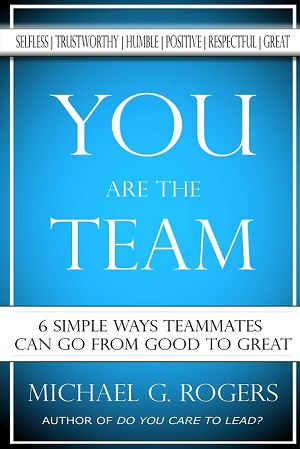Michael G. Rogers’ book, You Are The Team: 6 Simple Ways Teammates Can Go From Good To Great, delves deep into what it means to be an effective team member. While many leadership books focus on how leaders can inspire teams, Rogers shifts the focus toward individual teammates. His six key principles guide individuals on becoming better contributors to their teams, transforming both team dynamics and results. This approach makes the book a valuable resource for those looking to improve their teamwork skills in professional, personal, and athletic settings.

Read: Self Less
1. Be Selfless: Putting the Team’s Needs Above Your Own
The first principle emphasizes the importance of selflessness in a team environment. Great teammates understand that the team’s success comes first. Rogers points out that focusing on the team’s overall goals rather than individual desires leads to collective success. This means:
- Collaborating instead of competing with teammates.
- Supporting others in their roles, even if it means going beyond your job description.
- Celebrating team successes rather than just individual achievements.
Takeaway: A selfless teammate is one who prioritizes the group’s objectives and fosters an environment of mutual respect and collaboration.
2. Be Trustworthy: Build Trust Through Consistency
Trust is the foundation of any successful team, and Rogers highlights the importance of being trustworthy. Being trustworthy doesn’t just mean being honest; it means being dependable, accountable, and consistent. Rogers explains that trust within a team is built over time and can be damaged by inconsistency. To be a trustworthy teammate, you must:
- Honor your commitments and always follow through on your responsibilities.
- Be reliable and predictable in your actions and decisions.
- Admit mistakes and take responsibility when things go wrong.
Takeaway: Trustworthy teammates are the backbone of a strong team. Without trust, communication falters, and team cohesion deteriorates.
3. Be Humble: Recognize Your Strengths and Weaknesses
Humility is a key trait that separates good teammates from great ones. Humble teammates aren’t driven by ego; they recognize their strengths while acknowledging their weaknesses. According to Rogers, humility encourages:
- Listening more than speaking, giving space for others to share ideas and opinions.
- Accepting constructive criticism as an opportunity for growth.
- Sharing the credit for successes and being transparent about areas where you need improvement.
Takeaway: Humility fosters a team environment where individuals can grow and collaborate without ego-driven competition.
4. Be Respectful: Treat Others with Dignity
Respect is vital for a productive team environment. Rogers stresses that respect goes beyond basic politeness; it’s about truly valuing each team member’s contributions and perspectives. Respectful teammates:
- Show empathy and understanding towards others.
- Actively listen and encourage open communication.
- Avoid negative behaviors such as gossiping or undermining colleagues.
Takeaway: When respect is mutual, the team thrives, as each member feels valued and heard.
5. Be a Positive Communicator: Communicate Clearly and Constructively
Effective communication is at the heart of any successful team, and Rogers argues that teammates should strive to be positive communicators. This involves:
- Providing constructive feedback rather than criticizing or blaming.
- Using positive reinforcement to motivate others.
- Being clear and concise in communications to avoid misunderstandings.
Rogers also emphasizes the importance of listening in communication. Being a positive communicator means taking the time to listen and respond thoughtfully.
Takeaway: Great teammates excel in communication, fostering an atmosphere of clarity, encouragement, and constructive dialogue.
6. Be Committed: Show Dedication to the Team’s Success
The final principle focuses on commitment. Great teammates are fully committed to the team’s vision, goals, and outcomes. Rogers outlines several ways to show commitment, such as:
- Consistently giving your best effort and going above and beyond when needed.
- Being resilient and persevering through challenges.
- Supporting team decisions even when they might not align with personal preferences.
A committed teammate doesn’t waver when things get tough; they remain focused on the collective goal.
Takeaway: A committed teammate ensures that the team moves forward despite obstacles or individual challenges.
How to Apply These Lessons to Everyday Teamwork
- Self-Reflection: Regularly assess how well you embody the principles of being selfless, trustworthy, humble, respectful, a positive communicator, and committed. Identify areas where you can improve and make conscious efforts to develop those qualities.
- Open Dialogue: Encourage your team to openly discuss these principles and how they can be incorporated into daily practices. Foster a culture where team members hold each other accountable for following these guidelines.
- Continuous Improvement: Becoming a great teammate is an ongoing process. Commit to constant growth by seeking feedback from others and learning from mistakes.
Conclusion
In You Are The Team: 6 Simple Ways Teammates Can Go From Good To Great, Michael G. Rogers provides a blueprint for individual team members to elevate their contributions and improve team performance. The six principles—selflessness, trustworthiness, humility, respect, positive communication, and commitment—are simple yet powerful. When embraced, these values create a strong, cohesive team environment where everyone is empowered to succeed (Amazon).



